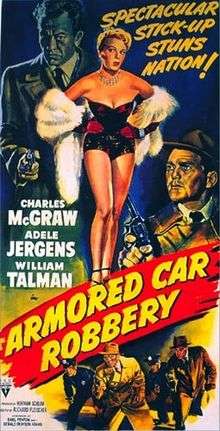Armored Car Robbery
| Armored Car Robbery | |
|---|---|
 Theatrical release poster | |
| Directed by | Richard Fleischer |
| Produced by | Herman Schlom |
| Screenplay by |
Gerald Drayson Adams Earl Felton |
| Story by |
Robert Leeds Robert Angus |
| Starring |
Charles McGraw Adele Jergens William Talman |
| Music by |
Roy Webb Paul Sawtell |
| Cinematography | Guy Roe |
| Edited by | Desmond Marquette |
Production company | |
| Distributed by | RKO Radio Pictures |
Release dates |
|
Running time | 67 minutes |
| Country | United States |
| Language | English |
Armored Car Robbery is a 1950 American film noir directed by Richard Fleischer, and starring Charles McGraw. The movie was filmed on location in Los Angeles, California.[2]
Armored Car Robbery is a heist movie, a subgenre of crime-based films. It tells the story of a well-planned robbery of cash from an armored car when it stops at a sports stadium. The heist goes awry and a tough Los Angeles cop sets off in hot pursuit of the culprits.
Plot
Mastermind Dave Purvis (William Talman) is a professional criminal who devises a scheme to rob an armored car on its last pickup of the day. He recruits Benny McBride, who brings Mapes & Foster to complete the gang of thieves.
Benny needs money because Yvonne (Adele Jergens), his striptease artist wife, has lost interest in him and is seeing another man. Unbeknownst to Benny, the man she is two-timing him with is Purvis.
The robbery itself, at Wrigley Field in Los Angeles, begins as planned but goes badly wrong when a passing police patrol car intervenes. Purvis kills one of the police officers from the patrol car and he and his fellow robbers make their getaway. Lt. Jim Cordell (Charles McGraw), the dead policeman's partner, takes it upon himself to bring in his partner's killer and throws himself into the case, assisted by a rookie officer.
Meanwhile, Purvis's gang unravels bit by bit as distrust and paranoia begins to build. Benny, wounded by police during the heist, is killed by Purvis as he demands his share of the loot from the robbery and attempts to seek medical help. Foster is killed by the police as the three attempt escape. After Mapes (Steve Brodie) gets away, he looks up Yvonne at the Burly Q where she works, intending to use her as a means to find Purvis, who has kept all the loot for himself. The waiting police, however, arrest Mapes at the Burly Q and learn Purvis's identity.
After a further manhunt, Lt. Cordell and his team corner Purvis and Yvonne at Los Angeles Metropolitan Airport, and Purvis is crushed by a taking-off plane as he tries to escape across the runway.
Cast
- Charles McGraw as Lt. Jim Cordell
- Adele Jergens as Yvonne LeDoux aka Mrs. Benny McBride
- William Talman as Dave Purvis aka Martin Bell
- Douglas Fowley as Benny McBride
- Steve Brodie as Al Mapes
- Don McGuire as Detective Danny Ryan
- Don Haggerty as Detective Driving Final Pursuit Car
- James Flavin as Lt. Phillips
- Gene Evans as William 'Ace' Foster
Reception
Critical response
The staff at Variety magazine gave the film a mixed review, calling it an okay film, and wrote, "RKO has concocted an okay cops-and-robbers melodrama ...[and] McGraw, Don McGuire and James Flavin, as cops, do very well. Talman and his cohorts put plenty of color into their heavy assignments. Adele Jergens attracts as a stripteaser and Talman's romantic interest."[3]
Time Out Film Guide review lauded the film and called the it "a model of its time." They wrote, "Almost documentary in its account of the heist that goes wrong and the police procedures that are set in motion, making excellent use of LA locations, it relies on superb high contrast lighting to meld reality into the characteristic noir look."[4]
Noir analysis
According to American studies and film professor, Bob Porfirio, Armored Car Robbery possesses the "film noir visual style" of the many RKO crime and suspense films of the early 1950s, such as: high-contrast photography integrating studio and location shooting, expressionistic lighting, deep focus, and haunting music (by Roy Webb).[5]
Film critic Roger Fristoe, believes director Richard Fleischer pushed the boundaries of the Motion Picture Production Code. One edict was that "Methods of crime shall not be explicitly presented or detailed in a manner calculated to...inspire imitation." Armored Car Robbery, however, had a blunt title, explicit violence and a detailed account of the planning and execution of the crime. As such, even though the criminals are caught, Armored Car Robbery tested the waters and helped set the stage for other film noirs and heist films like: The Asphalt Jungle (1950) and The Killing (1956) which shares some similarities.[6]
DVD release
Warner Bros. released the film on DVD on July 13, 2010, in its Film Noir Classic Collection, Vol. 5.[7]
References
- ↑ "Armored Car Robbery: Detail View". American Film Institute. Retrieved May 18, 2014.
- ↑ Armored Car Robbery at the Internet Movie Database.
- ↑ Variety, staff film review, January 1, 1950.
- ↑ Time Out Archived June 7, 2011, at the Wayback Machine. film guide, review, 2008. Last accessed: January 26, 2008.
- ↑ Silver, Alain, and Elizabeth Ward, eds. Film Noir: An Encyclopedic Reference to the American Style, film noir analysis by Bob Porfiero, page 13, 3rd edition, 1992. Woodstock, New York: The Overlook Press. ISBN 0-87951-479-5.
- ↑ Armored Car Robbery at the TCM Movie Database.
- ↑ Abrams, Simon. "Film Noir Classic Collection: Volume 5." SlantMagazine.com. July 20, 2010. Accessed 2011-11-19.
External links
- Armored Car Robbery at the American Film Institute Catalog
- Armored Car Robbery at the Internet Movie Database
- Armored Car Robbery at AllMovie
- Armored Car Robbery at the TCM Movie Database
- Armored Car Robbery film clip on YouTube